6 start with N start with N
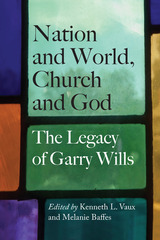
Garry Wills is the polymathic public intellectual bemoaned as missing from American letters. A professor emeritus at Northwestern University, he has built upon his early studies in classics and patristics, while bringing his considerable intellect to bear on American culture, politics, and religion, notably through provocative articles and books on wars, past and present presidents, and the Catholic Church Wills has distinguished himself in the crowded field of Civil War history; fearlessly taken on the legacies of Richard Nixon and Ronald Reagan, among other presidents; and offered a critical voice in many fraught ethical discussions, especially in the areas of war and peace.
Nation and World, Church and God gathers original critical reflections by leading writers and scholars on Garry Wills’s life work. Organized around the themes of “Classics,” “Civil War,” “War and Peace,” and “Theology, Church, and the Arts,” the book reflects the cultural acumen, fine-grained political analysis, ethical candor, and theological wisdom of one of America’s most prolific writers.

Germain Grisez has been a leading voice in moral philosophy and theology since the Second Vatican Council. In this book, such major thinkers as John Finnis, Ralph McInerny, and William E. May consider issues in ethics, metaphysics, and politics that have been central to Grisez's work.
Grisez's reconsideration of the philosophical foundations of Christian moral teaching, seeking to eliminate both legalistic interpretation and theological dissent, has won the support of a number of leading Catholic moralists. In the past decade, moreover, many philosophers outside of Catholicism have weighed carefully Grisez's alternatives to theories that have long dominated secular moral philosophy.
This book presents a broad spectrum of viewpoints on subjects ranging from contraception to capital punishment and considers such controversies as the scriptural basis of Grisez's work his interpretations of Aquinas, and his new natural law theory. The collection includes not only contributions from Grisez's supporters but also from critics of his thought, from proportionalist Edward Collins Vacek, SJ, to the neo-Thomist Ralph McInerny. A reply by Grisez, written with Joseph M. Boyle Jr., addresses the issues and viewpoints expressed, while an afterword by Russell Shaw reviews Grisez's pioneering work and conveys a vivid sense of the philosopher's personality.
As Grisez's influence grows, this volume will serve as an important touchstone on his contributions to moral and political philosophy and theology.
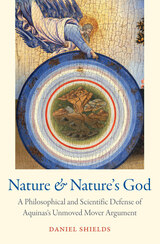
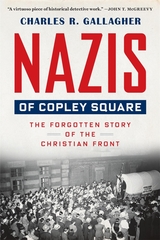
Winner of a Catholic Media Association Book Award
The forgotten history of American terrorists who, in the name of God, conspired to overthrow the government and formed an alliance with Hitler.
On January 13, 1940, FBI agents burst into the homes and offices of seventeen members of the Christian Front, seizing guns, ammunition, and homemade bombs. J. Edgar Hoover’s charges were incendiary: the group, he alleged, was planning to incite a revolution and install a “temporary dictatorship” in order to stamp out Jewish and Communist influence in the United States. Interviewed in his jail cell, the front’s ringleader was unbowed: “All I can say is—long live Christ the King! Down with Communism!”
In Nazis of Copley Square, Charles Gallagher provides a crucial missing chapter in the history of the American far right. The men of the Christian Front imagined themselves as crusaders fighting for the spiritual purification of the nation, under assault from godless Communism, and they were hardly alone in their beliefs. The front traced its origins to vibrant global Catholic theological movements of the early twentieth century, such as the Mystical Body of Christ and Catholic Action. The front’s anti-Semitism was inspired by Sunday sermons and by lay leaders openly espousing fascist and Nazi beliefs.
Gallagher chronicles the evolution of the front, the transatlantic cloak-and-dagger intelligence operations that subverted it, and the mainstream political and religious leaders who shielded the front’s activities from scrutiny. Nazis of Copley Square is a grim tale of faith perverted to violent ends, and a warning for those who hope to curb the spread of far-right ideologies today.
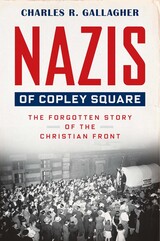
Winner of a Catholic Media Association Book Award
“A great, but deeply unsettling, revelation…This book is more than an account of Boston in wartime. It is a warning.”—Boston Globe
“The rare book by a scholar that is such a page-turner it is hard to put down…A potent brew of spy story, detective story, and frank, fearless account of how a significant wing of the Roman Catholic Church in the United States spawned a movement aimed at defending Hitler and sabotaging America’s war effort.”—David I. Kertzer, author of The Pope and Mussolini
“[A] well told, expertly researched, and much-needed history of the Christian Front, an organization that presages today’s far-right activity…Riveting.”—Commonweal
On January 13, 1940, FBI agents burst into the homes of seventeen members of the Christian Front, seizing guns, ammunition, and homemade bombs. J. Edgar Hoover’s charges were incendiary: the group, he alleged, was planning to incite a revolution and install a “temporary dictatorship” to stamp out Jewish and Communist influence in the United States. Interviewed in his jail cell, the front’s ringleader was unbowed: “All I can say is—long live Christ the King! Down with Communism!”
In this brilliant work of historical reconstruction, Charles Gallagher provides a crucial missing chapter in the history of the American far right. The men of the Christian Front imagined themselves to be crusaders fighting for the spiritual purification of the nation, and they were hardly alone in their beliefs.
Nazis of Copley Square chronicles the evolution of the front, the transatlantic cloak-and-dagger intelligence operations that subverted it, and the political and religious leaders who shielded it from scrutiny. A riveting tale of faith perverted to violent ends, it offers a potent warning to those who hope to curb the spread of far-right ideologies today.
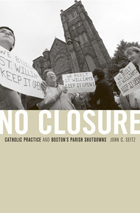
In 2004 the Roman Catholic Archdiocese of Boston announced plans to close or merge more than eighty parish churches. Scores of Catholics—28,000, by the archdiocese’s count—would be asked to leave their parishes. The closures came just two years after the first major revelations of clergy sexual abuse and its cover up. Wounds from this profound betrayal of trust had not healed.
In the months that followed, distraught parishioners occupied several churches in opposition to the closure decrees. Why did these accidental activists resist the parish closures, and what do their actions and reactions tell us about modern American Catholicism? Drawing on extensive fieldwork and with careful attention to Boston’s Catholic history, Seitz tells the stories of resisting Catholics in their own words, and illuminates how they were drawn to reconsider the past and its meanings. We hear them reflect on their parishes and the sacred objects and memories they hold, on the way their personal histories connect with the history of their neighborhood churches, and on the structures of authority in Catholicism.
Resisters describe how they took their parishes and religious lives into their own hands, and how they struggled with everyday theological questions of respect and memory; with relationships among religion, community, place, and comfort; and with the meaning of the local church. No Closure is a story of local drama and pathos, but also a path of inquiry into broader questions of tradition and change as they shape Catholics’ ability to make sense of their lives in a secular world.
READERS
Browse our collection.
PUBLISHERS
See BiblioVault's publisher services.
STUDENT SERVICES
Files for college accessibility offices.
UChicago Accessibility Resources
home | accessibility | search | about | contact us
BiblioVault ® 2001 - 2024
The University of Chicago Press









